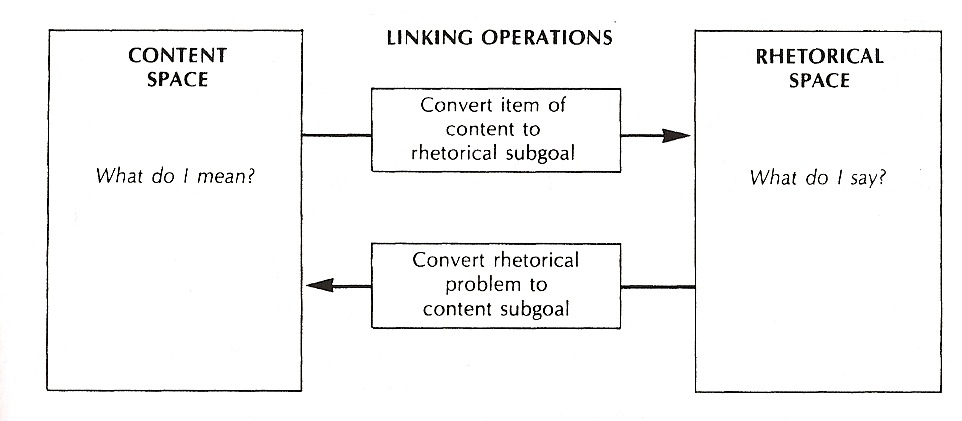 The Write Place: Guides for Writing and Grammar .............................Home
The Write Place: Guides for Writing and Grammar .............................Home Rethinking and Revision: Rethinking Your Concept of What "Writing" Is
Early in A Writer's Reference, Diana Hacker makes this statement: "Writing is a process of figuring out what you think, not a matter of recording already developed thoughts." This statement fits with one of the myths about writing discussed by me and the Scott, Foresman Handbook that writers don't have to have everything figured out before they start writing. As writers, we discover or "invent" what we mean to say and how we actually say it as we work on a piece of writing. Through multiple efforts and attempts at the writing task, we build our piece of writing. (See Invention as Making Thinking Visible and A Word or Two on the Writing Process.)
Revision may be a foreign activity for you--and I mean real revision, not simply editing or proofreading and calling it revision. It requires a different concept of writing: one that sees writing not as the packaging of already developed thought (and so somehow separate from thought), but a concept of writing that sees language and thought to be bound together. In fact, we can't think outside of language because language is the substance of our thinking. Thus, as we develop our thinking, we also develop our writing, and as we push and evolve our writing we do the same to our thinking. The bottom line of revision is about learning. Truncating the evolution of our writing (look up that word) by not revising connects directly to cutting short our thinking and learning.
Revision requires you to see your already-written draft as only an attempt, a version that is by definition not perfect. (See Approaching Second Drafts.)It requires you to look critically at what you have written and be open to changing and fixing what needs modification. You can change what you have written. I'll say it again: you can cut, move, modify, or expand the text that you have already written. Your words are not carved in stone. Perhaps it will take a bit of courage and faith to scrap something you have already done, but developing that courage is important as a writer.
The diagram above comes from research done by Carl Bereiter and Marlene Scarmandalia into how people write, and I think it is a very useful diagram. The "Content Space" represents the thoughts in our head. What do we mean to say? What do we think about the subject? How do we understand the goals for the piece of writing? It is our thinking. The "Rhetorical Space" is what is actually on the page. It is the paragraphs, sentences, and words written in our paper that expresses our thoughts. It is the "real text" and not our ideas about this text and its goals.
What characterizes novice writers, they found, is that these writers were only able to move one way in this relationship between "what I mean to say" and "what I say": These writers could take goals they determined in the Content Space and let it guide them in setting and pursuing goals in the Rhetorical Space. They could take an idea they had in their head and tell it in writing (what they called "telling writing"). BUT they had little capacity to take problems they saw in their Rhetorical Space and use those problems to pursue goals and solve problems in the Content Space. They found it difficult to take a problem they found in their text as a catalyst for changing their thinking on a subject. In other words, they were not able to see the relationship between writing and thinking.
To engage in productive revision, you must have the mindset which accepts that problems within what you have written may be rooted in problems in your thinking. You learn to trust that you can use your already-written text as the best tool to find places where your thinking is weak or disorganized or needed to go deeper. In short, you are able to see that re-thinking is fundamental to your re-writing.
I know that revision is hard, but to revise your writing you have to be courageous and rethink and learn, and this evolution of your thinking will drive the growth of your writing. The heart of "global revision" lies in this willingness to engage in rethinking and should always be your primary concern when you revise your writing. Only when you are satisfied that the ideas (including their development and structure) of "what you say" are "what you mean" (as best you can) do you shift to "local revision" where you engage in editing and proofreading.
For more on Global and Local Revision, see the Phases of Revision Guide.
Bereiter, Carl and Marlene Scardamalia. The Psychology of Written Composition. Hillsdale, N. J.: Lawrence Erlbaum Associates, 1987.

Free Web Counter
(Since 1/12/16)

This work is licensed under a Creative Commons Attribution-NonCommercial 4.0 International License | Contact Lirvin | Lirvin Home Page | Write Place Home
